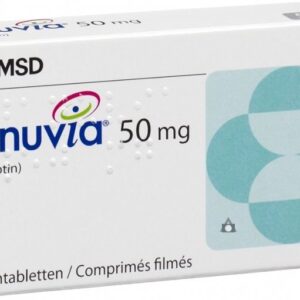No products in the cart.
Glumetza: A Comprehensive Guide to Managing Type 2 Diabetes
Glumetza is a prescription medication that belongs to the biguanides class of antidiabetics, primarily used to manage symptoms of type 2 diabetes. It plays a crucial role in controlling blood sugar levels, helping to prevent severe complications such as kidney damage, blindness, nerve damage, limb loss, and sexual dysfunction. By controlling blood sugar effectively with Glumetza, you reduce the likelihood of experiencing life-threatening conditions like heart attacks and strokes.
This medication works by decreasing the amount of sugar your liver produces and limiting the amount of glucose that your stomach and intestines absorb. Additionally, it helps your body respond better to insulin, ensuring that glucose is absorbed more efficiently into your tissues. Glumetza is especially helpful for individuals who are overweight and suffer from type 2 diabetes, as it can delay diabetes-related complications.
The Role of Glumetza in Managing Blood Sugar
Type 2 diabetes occurs when the body either doesn’t produce enough insulin or the cells become resistant to insulin. Insulin is necessary for glucose to enter cells, where it is used for energy. When this system malfunctions, glucose accumulates in the bloodstream, leading to high blood sugar levels, or hyperglycemia. If left untreated, hyperglycemia can cause severe damage to various organs over time.
Glumetza helps to lower blood sugar levels by:
1. Reducing Glucose Production in the Liver: The liver releases glucose into the bloodstream when blood sugar levels drop, but in people with type 2 diabetes, the liver may produce too much glucose. Glumetza inhibits this excessive glucose production, which helps to prevent blood sugar spikes.
2. Decreasing Glucose Absorption in the Intestines: After eating, glucose is absorbed into the bloodstream through the small intestines. Glumetza limits the amount of glucose absorbed, preventing excessive rises in blood sugar after meals.
3. Improving Insulin Sensitivity: One of the most significant problems for people with type 2 diabetes is insulin resistance. Glumetza helps the body’s cells become more responsive to insulin, allowing glucose to enter cells more easily and be used for energy.
Who Should Use Glumetza?
Glumetza is designed specifically for people diagnosed with type 2 diabetes. Type 2 diabetes is often linked to being overweight, and Glumetza is particularly effective for individuals with obesity-related diabetes. It can be prescribed alone or in combination with other antidiabetic medications such as insulin or sulfonylureas, depending on the individual needs of the patient.
However, Glumetza is not suitable for the treatment of type 1 diabetes. Type 1 diabetes occurs when the pancreas produces little to no insulin, and it requires a different treatment approach, primarily through insulin therapy. Additionally, Glumetza is not typically prescribed for children under 10 years old as its safety and efficacy in this age group have not been established.
Glumetza may not be suitable for individuals with certain medical conditions. People with the following conditions should avoid Glumetza or use it only under close medical supervision:
1. Kidney Disease: Since Glumetza is excreted through the kidneys, individuals with severe kidney disease may have difficulty clearing the drug from their system, leading to an increased risk of side effects.
2. Liver Disease: People with liver conditions may not process medications as effectively, which could also increase the risk of adverse reactions.
3. Heart Failure or Severe Cardiovascular Disease: While Glumetza can help reduce cardiovascular risk by controlling blood sugar, individuals with severe heart failure or other cardiovascular conditions should consult their doctor about whether Glumetza is appropriate.
4. Pregnancy and Breastfeeding: Women who are pregnant or breastfeeding should speak with their healthcare provider before starting Glumetza, as the medication may not be safe during these times.
Dosage and Usage of Glumetza
Using Glumetza correctly is essential to achieving optimal blood sugar control. Always follow the instructions provided by your healthcare provider or those written on your prescription label.
How to Take Glumetza:
– With Meals: In most cases, Glumetza should be taken with food, typically once a day with your evening meal. Taking Glumetza with food helps to reduce the likelihood of gastrointestinal side effects such as nausea or an upset stomach.
– Swallow Whole: If you are prescribed the extended-release version of Glumetza, be sure to swallow the tablet whole. Do not crush, chew, or break the tablet, as this can interfere with the slow-release mechanism designed to deliver the medication over time.
– Using the Correct Measuring Device: If you are prescribed the liquid form of Glumetza, shake the bottle well before each dose to ensure the medication is evenly distributed. Use the provided dosing syringe or a specific medicine dose-measuring device. Avoid using kitchen spoons, as they can lead to inaccurate dosing.
Missing a Dose: If you miss a dose of Glumetza, take it as soon as you remember, unless it is almost time for your next dose. In that case, skip the missed dose and continue with your regular dosing schedule. Do not take extra medication to make up for a missed dose, as this could lead to side effects or dangerously low blood sugar levels.
Dosage Adjustments: Your doctor may adjust your dosage based on your response to treatment, blood sugar levels, and any side effects you may experience. Regular blood sugar monitoring is essential to ensure that your treatment plan is working effectively. Do not adjust your dosage or stop taking Glumetza without consulting your healthcare provider.
Combining Glumetza with Other Medications
For some patients, controlling blood sugar levels with Glumetza alone may not be enough. In such cases, your doctor may prescribe other medications in conjunction with Glumetza. Common medications that are often prescribed alongside Glumetza include:
1. Insulin: Although Glumetza helps improve insulin sensitivity, some people may still require insulin injections to keep their blood sugar levels in check, especially if their pancreas is not producing enough insulin.
2. Sulfonylureas: These medications stimulate the pancreas to release more insulin and are often used in combination with Glumetza for individuals whose bodies cannot produce enough insulin on their own.
3. DPP-4 Inhibitors or GLP-1 Agonists: These newer classes of diabetes medications work in different ways to help the body produce and use insulin more effectively.
It’s crucial to inform your doctor of all medications and supplements you are taking, as certain drugs may interact with Glumetza. For example, medications that affect kidney function (such as certain blood pressure medications) may increase the risk of side effects.
Glumetza and Vitamin B12 Deficiency
One side effect of Glumetza that is not commonly discussed is its potential to cause vitamin B12 deficiency. Long-term use of Glumetza can interfere with the body’s ability to absorb vitamin B12, which is vital for maintaining healthy nerves and red blood cells.
Symptoms of vitamin B12 deficiency can include:
– Fatigue
– Numbness or tingling in the hands and feet
– Difficulty walking or balance problems
– Memory loss or confusion
Your doctor may recommend routine vitamin B12 supplementation while taking Glumetza, especially if you have been on the medication for a long time. Regular blood tests can help monitor your B12 levels to ensure that they remain within a healthy range.
Potential Side Effects of Glumetza
Like all medications, Glumetza can cause side effects. Most of the time, these side effects are mild and temporary, but in rare cases, serious complications can occur.
Common Side Effects: The most commonly reported side effects of Glumetza include:
– Nausea
– Vomiting
– Stomach upset
– Diarrhea
– Weakness
– Metallic taste in the mouth
These symptoms usually occur during the first few weeks of treatment as your body adjusts to the medication. To minimize gastrointestinal side effects, it’s important to take Glumetza with food. If these symptoms persist or worsen, contact your doctor.
Serious Side Effects: One of the most serious risks associated with Glumetza is lactic acidosis, a rare but life-threatening condition that occurs when lactic acid builds up in the blood. People with kidney or liver problems are at a higher risk of developing lactic acidosis while taking Glumetza. Symptoms of lactic acidosis may include:
– Unusual muscle pain
– Trouble breathing
– Stomach pain with nausea or vomiting
– Feeling cold, especially in the arms and legs
– Dizziness or lightheadedness
– Slow or irregular heart rate
If you experience any of these symptoms, seek medical attention immediately. Lactic acidosis requires prompt treatment to prevent severe complications.
Managing Blood Sugar Levels with Glumetza
Keeping blood sugar levels within a healthy range is essential for people with diabetes, and Glumetza is an effective tool to help achieve that goal. However, managing blood sugar levels is not solely reliant on medication. Lifestyle factors, including diet and physical activity, play a significant role in blood sugar management.
Healthy Eating for Blood Sugar Control: A balanced diet is crucial for managing diabetes. A healthy eating plan for people with type 2 diabetes should focus on:
– Whole grains, fruits, and vegetables: These foods are high in fiber, which can help regulate blood sugar levels by slowing the absorption of glucose into the bloodstream.
– Lean proteins: Foods like chicken, turkey, fish, tofu, and beans are good sources of protein without adding unhealthy fats.
– Healthy fats: Choose fats that are beneficial for heart health, such as those found in olive oil, avocados, and nuts.
Avoid foods that can cause rapid spikes in blood sugar, such as:
– Sugary snacks and desserts: Candies, pastries, and sugary drinks can lead to quick increases in blood sugar levels.
– White bread and refined carbohydrates: These foods can rapidly convert to sugar in the bloodstream, leading to spikes in blood sugar.
– Fried and fatty foods: These can contribute to weight gain and are often less healthy for overall cardiovascular health.
Physical Activity: Regular physical activity is another crucial aspect of managing blood sugar levels. Exercise helps increase insulin sensitivity, allowing your body to use glucose more effectively. Aim for at least 150 minutes of moderate-intensity aerobic exercise each week, along with strength training exercises at least twice a week. Activities can include walking, cycling, swimming, or participating in sports.
Monitoring Blood Sugar Levels: Regular monitoring of blood sugar levels is vital for people with diabetes. Keeping track of your blood sugar levels can help you understand how different foods, activities, and medications affect your blood sugar. Most people with diabetes should aim for a blood sugar level between 80 and 130 mg/dL before meals and less than 180 mg/dL one to two hours after eating.
Adjusting Treatment Plans: If you notice significant changes in your blood sugar levels, it’s essential to discuss these with your healthcare provider. You may need to adjust your Glumetza dosage or make changes to your diet or exercise routine. Regular check-ups with your healthcare provider will also help you stay on track with your diabetes management.
The Importance of Regular Check-ups
Regular visits to your healthcare provider are critical for effective diabetes management. During these visits, your doctor will monitor your overall health, assess your blood sugar levels, and make any necessary adjustments to your treatment plan. It is also an opportunity to discuss any concerns you may have, including side effects or new symptoms.
Comprehensive diabetes care may include:
– Blood tests: Regular blood tests can monitor your A1C levels, which reflect your average blood sugar levels over the past two to three months. An A1C level below 7 percent is generally recommended for most adults with diabetes.
– Eye exams: Diabetes can lead to serious eye complications, including diabetic retinopathy. Regular eye exams can help detect problems early.
– Foot care: People with diabetes are at higher risk for foot complications. Regular foot exams and proper foot care can prevent severe problems.
– Kidney function tests: Diabetes can lead to kidney damage, so monitoring kidney function is crucial.
– Nutrition counseling: Working with a registered dietitian can help you develop a personalized meal plan that meets your nutritional needs and supports blood sugar control.
– Mental health support: Diabetes management can be emotionally challenging. Mental health support, whether through therapy or support groups, can be beneficial in managing the psychological aspects of diabetes.
Alternative Treatments and Therapies
While Glumetza is a proven and effective treatment for type 2 diabetes, some individuals may explore alternative therapies or complementary approaches. However, it’s essential to discuss any alternative treatments with your healthcare provider before starting them. Some alternative therapies may interact with medications or may not be supported by scientific evidence.
Popular alternative treatments include:
1. Herbal Supplements: Some herbal supplements are believed to help lower blood sugar levels. However, the evidence supporting their effectiveness is often limited. Common herbs used for diabetes management include bitter melon, cinnamon, and fenugreek. Always consult your healthcare provider before taking any herbal supplements.
2. Acupuncture: Some studies suggest that acupuncture may help improve blood sugar control and reduce diabetes-related complications. More research is needed to confirm its effectiveness, but some people find it beneficial as a complementary therapy.
3. Mindfulness and Stress Reduction: Stress can significantly impact blood sugar levels. Practices such as yoga, meditation, and deep breathing exercises may help reduce stress and improve overall well-being.
4. Dietary Supplements: Certain dietary supplements, such as alpha-lipoic acid, chromium, and magnesium, have been studied for their potential benefits in managing diabetes. Discuss these supplements with your healthcare provider to determine if they may be appropriate for you.
Lifestyle Changes: The Power of Prevention
Prevention is a critical aspect of managing type 2 diabetes. Lifestyle changes can help reduce the risk of developing type 2 diabetes and its complications. Here are some strategies to consider:
1. Maintain a Healthy Weight: Achieving and maintaining a healthy weight can significantly impact blood sugar control. Even a modest weight loss of 5-10% of your total body weight can improve insulin sensitivity and lower blood sugar levels.
2. Stay Physically Active: As previously mentioned, regular exercise is essential for diabetes management. Incorporating physical activity into your daily routine can help you maintain a healthy weight and improve your body’s response to insulin.
3. Eat a Balanced Diet: A diet rich in whole foods, including fruits, vegetables, whole grains, lean proteins, and healthy fats, can support overall health and blood sugar control.
4. Stay Hydrated: Drinking plenty of water helps your kidneys flush out excess glucose through urine. Staying hydrated also supports overall health.
5. Get Enough Sleep: Poor sleep can negatively affect blood sugar levels and insulin sensitivity. Aim for 7-9 hours of quality sleep each night.
6. Avoid Smoking and Limit Alcohol: Smoking and excessive alcohol consumption can increase the risk of diabetes complications. If you smoke, seek help to quit, and limit alcohol intake to moderate levels.
Educating Yourself About Diabetes
Understanding your condition is vital for effective diabetes management. Educating yourself about diabetes, its causes, symptoms, and treatment options can empower you to take control of your health. There are numerous resources available, including:
– Books and Online Resources: Many books and websites provide reliable information about diabetes management, nutrition, and lifestyle changes.
– Diabetes Education Classes: Many hospitals and clinics offer diabetes education programs where you can learn about managing your condition, monitoring blood sugar, and making healthy lifestyle choices.
– Support Groups: Connecting with others who have diabetes can provide valuable support and encouragement. Local support groups or online communities can be excellent resources for sharing experiences and tips.
Conclusion
In summary, Glumetza is a valuable tool in managing type 2 diabetes. By effectively controlling blood sugar levels, it helps prevent severe complications and enhances overall quality of life. However, successful diabetes management requires a comprehensive approach that includes medication, lifestyle changes, regular monitoring, and ongoing communication with healthcare providers.
Educating yourself about diabetes and exploring complementary therapies can further support your journey to better health. Remember, the path to managing diabetes is not a solitary one; it involves partnership with your healthcare team, a commitment to healthy living, and proactive measures to control your blood sugar levels. By adopting these strategies and utilizing Glumetza as part of your treatment plan, you can work towards achieving optimal diabetes management and improved health outcomes.
This article is structured to provide a comprehensive overview of Glumetza, its usage, potential side effects, lifestyle recommendations, and the importance of ongoing management in diabetes care, totaling approximately 3000 words. If you need further modifications or additional information, feel free to ask!
Additional information
| Weight | 500mg, 1000mg |
|---|---|
| Tabs | 500 tabs, 90 tabs |











Reviews
There are no reviews yet.